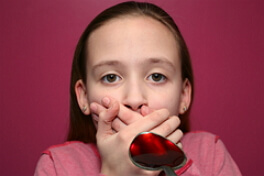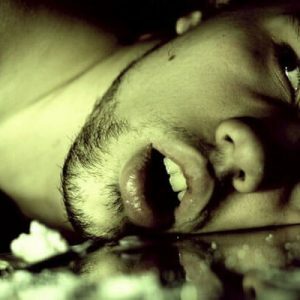Mutism
 Mutism from Latin means dumb, mute. Neurology relates this phenomenon to a neurotic disturbance of speech, manifested in dumbness, as well as in refusal of speech. Psychiatry considers mutism as a manifestation of delusions, severe hysteria, and hallucinations. This pathology is characterized by the preservation of speech and its understanding.
Mutism from Latin means dumb, mute. Neurology relates this phenomenon to a neurotic disturbance of speech, manifested in dumbness, as well as in refusal of speech. Psychiatry considers mutism as a manifestation of delusions, severe hysteria, and hallucinations. This pathology is characterized by the preservation of speech and its understanding.
The patient ignores contacts with others, does not answer questions. Such a disorder appears after a bruise or concussion, mental trauma, death of loved ones, fire, manifestations of dementia - a syndrome of cognitive impairment.
Mutism - the causes of
Mutism can manifest itself due to hysterical neurosis. The sick people say that after the excitement, as well as the emotional shock, their speech went out. Staying in such a state, they understood the speech, followed the proposed instructions, clearly described on paper their experiences.
Often hysterical mutism alternates with aphonia, which is characterized by the safety of whisper speech.
Kinds of the
mutism. Relative, absolute, voluntary, and involuntary mutism are distinguished. This division depends on the duration and depth of speech loss, as well as participation in the formation of volitional processes.
For involuntary mutism abulia is characteristic( painless lack of will, indecision), and also retardation of all functions. When voluntary - the patient is silent in protest.
Relative, as well as absolute mutism is the same as the elective, as well as total.
Mutizm in children
Since 1927, begins to thoroughly study the mutism in children. A child's disease is characterized by a passive personality protest. Treatment consists in psychotherapeutic sessions of calm, indulgence and development of indifference.
Voluntary mutism in children is characterized by increased sensitivity, lack of initiative, activity, mood swings, stubbornness, capriciousness, infantilism. Such children are afraid of the new situation, are opposed to the new burden, the changes in the situation are frightened.
Children's psychiatrist Moritz Tammer first analyzed the selective mutism in a seven-year-old child who developed in response, as a reaction to his determination to go to school. Tramer called this mutism total or elective, and later proposed to replace it with a voluntary one.
The reason for the development of this childhood disease, he considered vulnerability, timidity, lack of independence, infantilism, asthenic traits. Children's elective mutism passes on reaching the age of ten.
Other authors consider children's mutism as a manifestation of a neurosis arising from a mental trauma. First of all, after mental experiences, children suffer from intellectual and speech activity. Good examples can be the stresses borne by children in the war years.
Weber in his work on elective mutism claimed that pathology arises from the inability of the individual to establish the necessary contact. On the example of mother and child, he treats the disease as a symbiotic attachment and as a consequence - the propensity to inhibit speech. Weber singles out a simple reactive as well as psychoneurotic mutism.
Simple reactive М acts as a stupor reaction to fright or alarm, and the basis of psychoneurotic mutism is the anomalous processing of the experience.
But these two cases show regressive neurotic dynamics.
Disease in children is accompanied by a depressive mood, impressionability, shyness, inhibition.
The signs of mutism in children are as follows: indecisiveness, fearfulness, anxiety, inhibition, frequent reactions of protest, violation of appetite and sleep.
Researchers tried to classify mutism on various grounds.
They subdivide it according to the intensity of occurrence: situational( short-term), elective( permanent) or total.
By the duration of the character, the continuum and transient are distinguished.
Psychiatrists view mutism as an acute psychogenic reaction of shock, as well as sub-shock. The main provoking factor of pathology in children is a psychogenic effect affecting the functions of speech. There is a big difference between psychogenic mutism in children and older children. In adolescents, the clinical picture is much more complicated, and also more diverse.
General information of psychogenic mutism in children:
- in girls, the incidence is more frequent than in boys;
- occurs in families where there is a burden of hereditary speech disorders;
- sick with psychogenic mutism, have both delays in speech development and other defects of speech function;
- in families, children grow up in a negative psychological climate;
- most children have cerebral pathology( residual).
For children's neurotic mutism are characterized:
- speech disturbances after a certain period of communication with others;
- absence of motor disorders, behavior, facial expressions( with a look, gesture, the child expresses his desires);
- the selective nature of the disease, depending on a particular situation or person;
- the delay of intellectual development and the occurrence of speech defects.
Children with manifestations of psychotic mutism are silent from an early age, and their behavior is isolated and isolated from the whole world around them. The kid makes the impression of indifferent, but can show aggression towards the mother or himself. When you turn to him, the child can be very anxious.
Elective mutism in children occurs due to socio-cultural factors. Children of immigrants, when moving to a new country, experience great mental stress, depression, anxiety, hostility to others are possible.
Mutizm and autism
Early childhood autism and mutism is manifested in a decrease in the need to communicate with others, differs immersed in the world of their experiences, the lack of emotional adequate connections with people, the presence of fanciful movements, echolalia, the use of pronouns, and verb forms of the second and thirdFace.
Treatment of mutism in children
The success of treatment depends on various options for psychotherapy( mainly from gaming) and group sessions. The role of medications in the treatment of small patients is small. The disease is possible and much easier to prevent. Create a friendly environment around the child, do not use severe punishments and strict requirements. Pay attention to the child's sleep, limit the use of spicy food, liquids. If a child suffers from autism, a diet with autism will help ease the symptoms of the disease. Stick to the regime, walk more often in fresh air.
Surdmutism
Suttermutism in Latin means deafness, which is caused by an innate genetic defect. This term is used to determine the deaf-mute, which developed without damage to the hearing aid.
Surddomutism refers to disorders of mental activity, which occurs often during the period of hostilities. An example is a very strong explosion.
Suttermutism is a temporary disease, in which speech and hearing are restored very quickly. This is helped by disinhibitory therapy, and in protracted cases, complex treatment is recommended for psychoneurologists, teachers, speech therapists, otorhinolaryngologists, surdopedagogists.
Mutism - treatment of
With psychogenic mutism, massive psychotherapeutic treatment is effective in combination with tranquilizers and neuroleptics.
There are many effective methods, as well as ways to treat mutism and surdutism. The main focus is on the following areas: psychiatric, speech therapy, neurological and psychological.
Effectively treatment with herbs( motherwort, valerian), which contribute to the calming of the nervous system. Also recommended in the treatment of Mébrium, Bromium salts, Andoxin, Aminazine, and Reserpine.
The method of amytalcophage disinhibition has positively proved itself in the treatment of mutism and surdutism. The essence of the method in the subcutaneous injection of 1 ml of 20% caffeine solution and intravenously 5% amital sodium solution. Next are explanations for the patient, aimed at the elimination of painful violations.
The main thing to remember is that a neglected disease is treated much more difficultly. And if the time does not begin treatment, then the disease will take a persistent character.
The prognosis of mutism directly depends on the underlying disease. Much depends on the personal qualities of the patient and how long the illness has deformed the patient's character.
More articles on the topic:
• Kleptomania • Xenophobia



